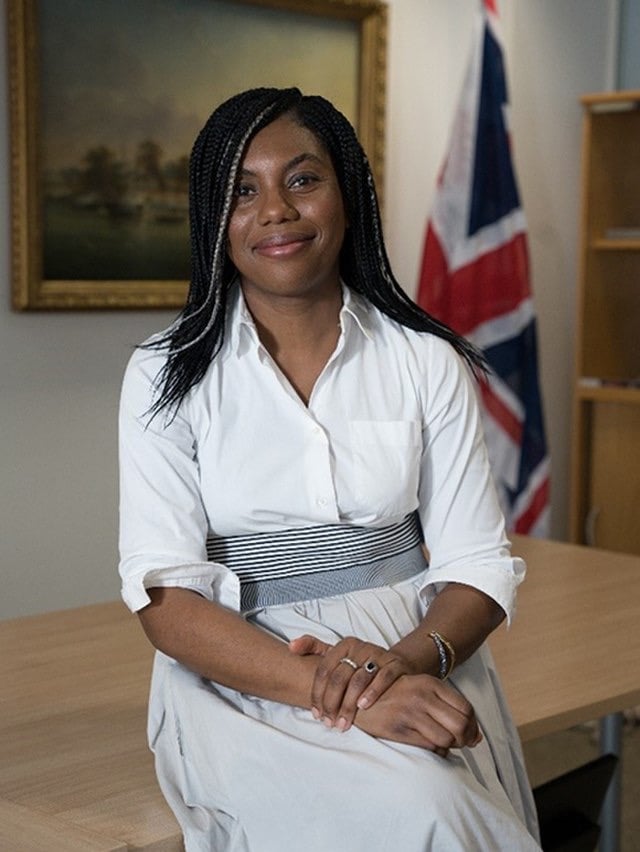Conservative leader tells podcast she is ‘Nigerian through ancestry’ but ‘by identity, I’m not really’ following criticism from Nigeria’s vice-president
Conservative Party leader Kemi Badenoch has revealed she no longer identifies as Nigerian and has not renewed her passport for the West African country since the early 2000s, stating that “home is where my now family is” in the UK.
Speaking on former MP Gyles Brandreth’s Rosebud podcast, the British-born politician who grew up in Lagos said she was “Nigerian through ancestry” but “by identity, I’m not really,” adding that she had to obtain a visa when returning to Nigeria for her father’s funeral in 2022.
The 44-year-old’s comments come months after Nigeria’s Vice-President Kashim Shettima accused her of “denigrating her nation of origin” and suggested she could “remove the Kemi from her name” if she was not proud of her Nigerian heritage.
Identity and Belonging
Badenoch, who was born in Wimbledon in 1980 to Nigerian parents before being taken to Lagos as a child, explained her complex relationship with her country of origin during the wide-ranging podcast interview.
“I have not renewed my Nigerian passport, I think, not since the early 2000s. I don’t identify with it anymore; most of my life has been in the UK and I’ve just never felt the need to,” she told Brandreth.
Despite maintaining family connections and interest in Nigerian affairs, Badenoch emphasised her sense of disconnection: “I know the country very well, I have a lot of family there, and I’m very interested in what happens there. But home is where my now family is, and my now family is my children, it’s my husband and my brother and his children, in-laws.
She revealed that when her father, Dr Femi Adegoke, died in 2022, she needed to obtain a visa to travel to Nigeria, describing the process as “a big fandango.
Early Life Shaped Political Views
The Conservative leader, who returned to Britain aged 16 during Nigeria’s economic collapse in the 1990s, said her early experiences in the country shaped her political outlook, particularly “why I don’t like socialism.
“I remember never quite feeling that I belonged there,” she reflected, adding that she recalled “coming back to the UK in 1996 thinking: this is home.”
Badenoch was one of the last people to receive British birthright citizenship before the rules were abolished by Margaret Thatcher’s government in 1981. She described discovering her British citizenship as “a marvel to so many of my contemporaries, so many of my peers.”
The reason for her return to the UK was “a very sad one,” she explained: “It was that my parents thought: ‘There is no future for you in this country’.”
Defending Britain Against Racism Claims
In a controversial statement, Badenoch claimed she had not experienced racial prejudice in the UK “in any meaningful form,” using this as a basis to defend Britain against accusations of racism.
“I knew I was going to a place where I would look different to everybody, and I didn’t think that that was odd,” she said. “What I found actually quite interesting was that people didn’t treat me differently, and it’s why I’m so quick to defend the UK whenever there are accusations of racism.”
She acknowledged that whilst she had not experienced meaningful prejudice, “that doesn’t mean prejudice doesn’t exist or that it doesn’t happen” to others.
Conservative Party as ‘Extended Family’
Badenoch described the Conservative Party as part of her “extended family,” saying: “So much of what we do goes beyond party policy; it’s instinct. We recognise each other, we have the same sort of squabbles.”
When asked about party plots and infighting, she characterised them as “extended family stuff,” comparing political disagreements to family dynamics.
Previous Tensions with Nigerian Officials
The interview follows months of tensions between Badenoch and Nigerian officials over her comments about her upbringing. In December 2024, Vice-President Shettima responded to Badenoch’s descriptions of growing up “in fear and insecurity” in a country “plagued by corruption.
Shettima said his government was “proud” of Badenoch “in spite of her efforts at denigrating her nation of origin,” comparing her unfavourably to former Prime Minister Rishi Sunak, whom he praised as “a brilliant young man” who “never denigrated his nation of ancestry.
Badenoch’s spokesperson responded at the time that she “stands by what she says” and is “not the PR for Nigeria,” adding: “She tells the truth. She tells it like it is. She’s not going to couch her words.”
Complex Heritage and Identity
Born Olukemi Adegoke to a physiology professor mother and doctor father, Badenoch spent her formative years between Nigeria, the United States, and Britain. She returned to the UK permanently at 16 to continue her education whilst living with a family friend in south London.
Her journey from Lagos to leading Britain’s Conservative Party represents a complex narrative of migration, identity, and belonging. Whilst maintaining she has Nigerian ancestry and family connections, her declaration that she no longer identifies with the country marks a definitive statement about where she sees her future and loyalties.
The Conservative leader’s comments are likely to reignite debate about diaspora identity, particularly among British-Nigerians who maintain strong connections to both countries. Her stance contrasts with many public figures of dual heritage who embrace both aspects of their identity.
As she positions herself as a potential future Prime Minister, Badenoch’s relationship with her Nigerian heritage continues to evolve, shaped by both personal experience and political necessity in British politics.
Follow for more updates on Britannia Daily
Image Credit:
This is a licensed photograph used in its original cropped form:
- Kemi Badenoch MP as Minister for Equalities and Levelling Up Communities – Description: Kemi Badenoch MP as Minister for Equalities and Levelling Up Communities.jpg, published on 31 March 2022, by the Department for Levelling Up, Housing and Communities, licensed under the UK Open Government Licence v3.0 (OGL v3.0), as part of the Levelling Up for Families: Annual report of the Supporting Families programme 2021–2022



